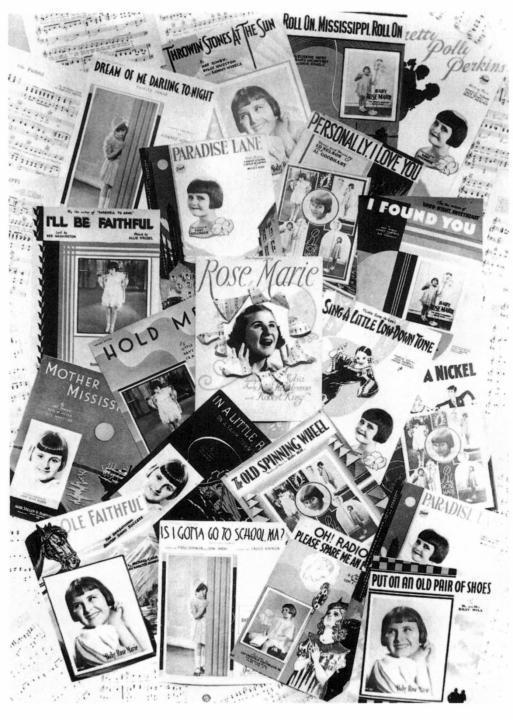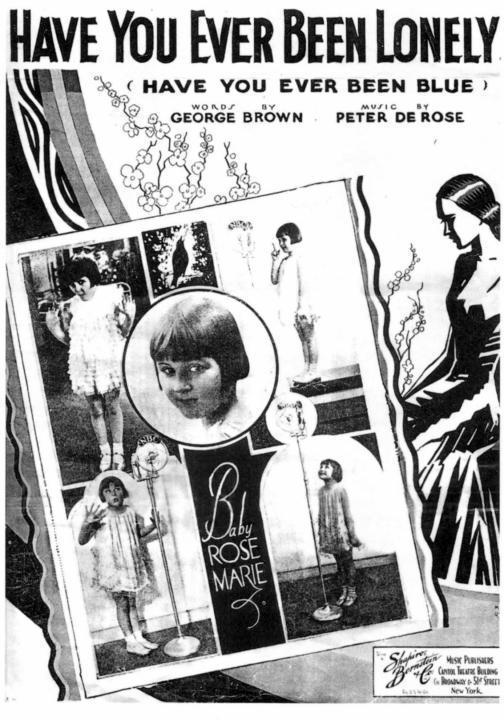Hold the Roses (5 page)
Authors: Rose Marie

Dear readers, here's something you will learn about for the very first
time. I was very fortunate that nobody has discussed this "scandal" during
all these years. I myself just recently learned some of the other details of
this "scandal." The "other woman" refused to give my father a divorce.
The two children they had together were also named Rose and Frank. I
was supporting two families for years! How do you like that, boys and
girls?
The first few cities on the tour went smoothly, and I was having a ball
seeing all the sights and traveling. It was quite an education. Speaking of
education, I also had my formal schooling correspondence courses to work
on each day. I was very proud of myself. I got all A's while on my tour. When we hit Rochester, New York, they got us with the child labor laws
again. I couldn't go on. Tapping my foot in tempo was considered dancing, and the singing was "hard labor." Can you believe that? The authorities came backstage and made sure I didn't go on. The manager of the
theater was heartsick. We had a full house, and the people were very disappointed. They tried to work out some sort of an agreement where the
theater would pay a percentage to a children's hospital, but the authorities
wouldn't budge. Si Wills, who was the second act on the bill, with his wife
Joan Davis (who went on to become a big star), asked my father if we had
any records of mine. My father said "yes." Si then went over to the authorities and asked them if I could go on stage and just move my mouth to the
recording. They thought about that for about an hour, and finally said
okay-but no toe-tapping!
They got a phonograph (actually a Victrola), put it on the stage, and
Si went out and told the audience what had happened with the law. "You'll
see her," he said, "and she'll be singing her records." They all applauded. He
introduced me. I went on and lip-synced about four of my records, and it all
went over just fine. Another first! I did the first record/pantomime act.
After Rochester, I went to Syracuse, Columbus, Philadelphia and Pittsburgh, where I played the Stanley Theater with Dick Powell, the yearround MC. I would do my act, then Dick would call me back and we
would do a duet. I sat on his lap and sang "You Don't Know What You're
Doing." It was a cute song, during which I would mess up his hair and say,
"What do you do with the sardines?" (His hair was oily.) It got a big laugh,
believe it or not.
One afternoon I was doing the number with Dick on the extended
stage, in front of the regular stage. I guess the spotlight was very strong. I lost
my balance and fell into the orchestra pit where the organist, who was watching
the show, caught me and lifted me back up onto the stage. I was crying.
Dick asked, "Do you want to go off?"
I said, "No, we'll finish the song."
We did and I ran off. ..with a broken arm.
Small world department: Many years later, while in Hawaii promoting a telethon, I was doing some radio interviews when one of the listeners
called in and said, "Do you remember falling off a stage in Pittsburgh? I
was the one who caught you, lo those many years ago."
The next big spot was Cleveland. My father was arrested 127 times.
Child labor laws again.

With Dick Powell in my dressing room backstage at the Stanley Theatre in Pittsburgh

SpltiqtivA2 ivt 4e POO'b2s
I had arrived for my engagement at the Palace Theater and the law said
they wouldn't let me go on. It was funny, because Mitzi Green, the great
performer and impressionist who also had made some movies, was about
thirteen years old when she was working at the 105th Street Theater in
another part of Cleveland. Mitzi and I became very good friends and remained so until the day she passed away. The management asked why
Mitzi could perform and I couldn't. The law said she did impressions; she
didn't sing and dance. So here we went again! The management tried, just
as they had at the theater in Rochester, to work out some sort of arrangement whereby a children's hospital and/or local orphanages would get some
financial aid as a result of our shows. I thought, from what little I heard
and understood about this discussion, it was a pretty nice idea. The authorities would have none of it. Instead they decided they would arrest my
father after each show. Nice people, eh?
Frankly, it was a little scary to me, but nevertheless, I would do my
show and immediately after I took my last bow, they would take my
father downtown, arrest him, let him go, and he would come back to the
theater. I would do my next show-they'd arrest him and let him go
again. This went on seven days a week for the two weeks I was there. In
addition to arresting my father, the authorities thought it would be a
good idea for me to visit the children in the hospital and the orphanages.
Perhaps they thought that the people of Cleveland would view the constant arrests of my father less harshly. I loved these visits because it gave
me a chance to spend a little time with children, but more importantly, it made me realize how lucky I really was. At least I had a mother and
father and I was healthy.

I was still doing my radio show on Sunday mornings from each town
in which I played. We'd go to the radio station-NBC would send some
kind of script to go by, we'd rehearse, and I would do the show at 12:15.
Immediately afterward, I would go back to the theater and do my shows. I
think at this point I was doing six shows a day. Sounds like a lot, I know,
but I didn't mind because I learned so much from the other acts. Being the
only child in the show, the rest of the cast members thought I should have
playtime in between shows. Sometimes we all played games together, but
the most fun for me was learning all of their crafts. The juggler taught me
how to juggle; I learned how to jump on a trampoline, walk on a gigantic
wooden ball, and do all of the wonderful tricks with a yo-yo.
Years later when my daughter got a yo-yo-I think she was seven-I showed her all the tricks. She stood there, eyes wide as saucers, mouth
open, and said, "Gee mother, where did you learn how to do that?"


I told her, "I worked with some very talented and wonderful people
when I was six and a half years old, and they taught me all these things."
There was a great act called "Panzy the Horse," which consisted of
two guys in a horse costume. One was the head of the horse; the other was
the back end of the horse. They were the Mayo Brothers. They had a girl
with them, dressed as a ringmaster. She had long legs, blonde hair, a short
skirt, a tall hat, and a whip. She was beautiful. She would put "the horse"
through its paces: Sit up, fall down, and roll over. Very funny and very
clever. It was what we used to call in vaudeville a "number-two act," meaning a novelty act.
One night Sam Goldwyn came in to see the show. When it was over,
he came backstage to see the girl in the horse act. He told her he would
make her a star and wanted her to come to California.
She said, "What about the boys?"
He replied, "No, I don't want them, just you."
He asked her name and she said, "Virginia Rittinshroud."
"That's too long, it won't look good on the marquee," he said.
With that, she replied, "Okay, I'll take the boys' name."
And that's how she became Virginia Mayo. She did become a motion-picture star and appeared in quite a few movies with Danny Kaye and
James Cagney (the best picture was White Heat). White Heat really showed
Virginia to be not only beautiful, but also a damn good actress. She, of
course, did many more movies and is now retired. She does a great deal of
charity work, which keeps her busy.
Virginia and I live about a half hour away from each other and manage to see each other at least once or twice a month. We sometimes go to
dinner together and attend various charity parties. And yes, dear readers,
she is still as lovely as she always was.
Larry Rich was a variety-type act. There was an orchestra, a couple of
acts, and three sisters called The Andrews Sisters! It was like a show within
a show, and it was usually the finale of the stage show. The girls and I
became good friends; even though they were a little older than I was, we
spent a lot of time together. We got along beautifully, and they always
looked out for me. I often went to their hotel room, where we would sit on
the bed, talk, and eat sandwiches. They were like my sisters. We were on
the road quite a bit, and I always spent time with them. When their first big hit record came out, I was so proud of them; it was like it was my
family. They made so many hit records and appeared in wonderful movies,
which brought them to the height of their marvelous career.
